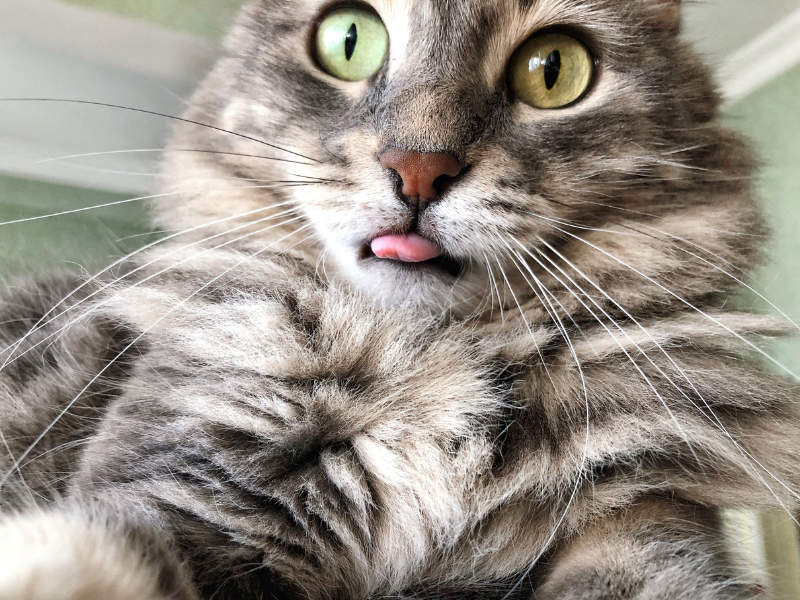Cats have the cutest expressions, from adorable slow kissy winks to sticking out their tongues. Blep, mlem or whatever you’d like to call it, this act of extending the tongue is outright adorable. But it can sometimes be cause for concern. In this article, we’ll talk about:
What’s in a cat’s tongue?
A cat’s tongue is packed with tiny, hollow barbs called papillae. These are stiff spines that are covered in keratin and are curved backwards to help collect particles easily. More than just for eating, their tongues are used to help cats groom themselves and stay healthy.
8 reasons why your cat sticks her tongue out:
1 She has picked up a strange scent.
When your cat suddenly stops doing something, stares into space, and sticks out her tongue with a sneer or grimace on her face, she may be picking up on chemical signals. This is known as the Flehmen response, in which your cat collects the scent through her open mouth and flicks it up using her tongue to reach the vomeronasal or Jacobson’s organ. This organ helps cats diagnose unfamiliar scents or even the sexual availability of female cats.
2 Your cat is feeling relaxed.
As your cat is sleeping soundly, her jaw may loosen and cause her tongue to stick out. Similarly, her tongue can also make an appearance as you are petting her and she is enjoying the gentle motions.
3 She has something stuck between her teeth.
If you notice your cat repeatedly sticking out her tongue after consuming a meal or treat, check for food particles that may be lodged in between her teeth or even mouth. Kittens may also stick out their tongue as they attempt to loosen their bothersome baby teeth.
4 Your cat is self-grooming.
Cats lick to keep themselves clean. Their tongue effectively removes dirt particles, while the evaporating saliva stuck on her fur helps lower her body temperature. Sometimes, she may use her tongue to fiddle on unknown particles. Or she may simply forget to stick her tongue back in after a grooming session.

5 She could be feeling hot.
On sweltering days, pay attention when you find your cat sticking out her tongue more often than usual. She may be on the brink of a heatstroke, grooming herself excessively in an attempt to stay cool. Give her access to fresh water, such as cool liquid flowing from a running faucet. Never allow your cat’s temperature to reach 105 Fahrenheit. Watch for symptoms of late-stage heatstroke: lethargy, rapid pulse, rapid breathing, red tongue, vomiting, and stumbling.
6 Your cat is experiencing motion sickness.
Not all cats are built for long-distance road trips. If you notice your cat sticking his tongue out, panting, and drooling while you’re traveling, she may be going through a bout of motion sickness. This may be caused by the stress of travelling, a previous bad experience associated with car rides, fear of unfamiliar surroundings, or an inner ear imbalance (which gets aggravated when the car is in transit).
If you know that your cat suffers from motion sickness, find ways to make her car ride more comfortable. Practise going on shorter road trips before taking a long one. Let your cat get used to traveling in a carrier and surround her with her favourite beddings and toys. If necessary, ask your veterinarian for anti-nausea medication that your cat can take.
7 She has come into contact with toxic food or items.
If your cat has accidentally licked household cleaners, pesticides, or poisoned prey animals, she may try to get rid of the taste by sticking her tongue out. Observe her for any of the following symptoms: drooling, vomiting, appetite loss, diarrhea, lethargy, weakness, depression, pale or yellowish gums, excessive thirst, urination, nervousness, hyperactivity, muscle tremors, seizures, and coma. When these symptoms manifest, take her to the emergency clinic immediately.
8 Your cat may have an underlying medical issue.
If your cat has been sticking out her tongue more often than usual, she may be suffering from an undiagnosed sickness such as feline stomatitis, dementia, respiratory infection, and dental problems like gingivitis or periodontitis. Try to recall when your cat started doing it, and if there are other symptoms accompanying the action.
In conclusion
It’s normal for cats to stick out their tongue when they come across a strange scent, when they groom themselves, and when they’re feeling relaxed. However, if your cat’s blepping is accompanied by alarming symptoms, don’t hesitate to schedule a visit to your veterinarian. This way, you can guarantee your feline companion’s health and well-being.
If you’re interested in becoming a cat parent, we have all the information you need right here! We also have cat-related guides on our blog, such as how to introduce a kitten to a cat and how to train your cat to wear a harness.
Leave a comment
Your email address will not be published. All fields are required.